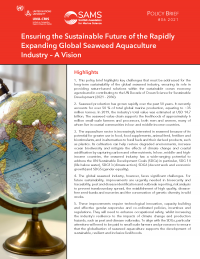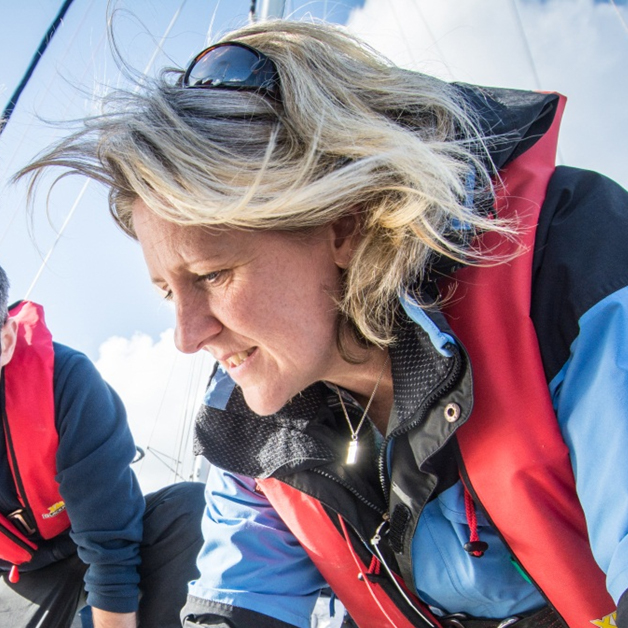
Seaweed cultivation is the most rapidly expanding sector in aquaculture production, accounting for more than 50 percent of total global marine production, equating to around 34.7 million tonnes. With seafood increasingly used for food (and animal feed), as well as in fertilisers, food supplements, and even alternatives to plastics, the industry has grown rapidly in the past 50 years, reaching a value of US$14.7 billion in 2019. The seaweed cultivation industry supports the livelihoods of over 6 million small-scale farmers and processors, many of whom are women, predominantly in low and middle-income countries. However, the rapid expansion of the industry has taken place in tandem with increasing pressures from warming seas caused by climate change and an over-reliance on certain species, which has seen the industry ravaged by pests and diseases.
“Coastal communities in low to middle income countries have come to rely on seaweed farming for their livelihoods, but we are already seeing the detrimental impacts due to lack of biosecurity protocols on this industry.”
Elizabeth Cottier-Cook, Scottish Association for Marine Science (SAMS), Scotland.
A recently published policy brief written by an international expert team highlights key recommendations to ensure the long-term sustainability of the growing global seaweed industry and its role in providing nature-based solutions within the sustainable ocean economy agenda and in contributing to the UN Decade of Ocean Science for Sustainable Development (2021 – 2030).
The authors, who are based at 30 institutions across 18 countries, have collectively outlined a message for creating sustainable value chains, inclusive production systems, and gender balanced policies for the rapidly expanding seaweed industry, based around eight key recommendations. The recommendations are a call for action to support technological innovation, capacity building, and effective gender-responsive and coordinated policies, incentives, and regulations:
All contributing experts collectively recommended that for future sustainability, improvements are urgently needed in biosecurity and traceability, pest and disease identification and outbreak reporting, risk analysis to prevent transboundary spread, the establishment of high quality, disease-free seedbanks and nurseries, and the conservation of genetic diversity in wild stocks.
Epidemics such as SARS – and, more recently, COVID-19 – are increasingly considered as international security issues, and have intensified the need for increased awareness of biosecurity at levels. This includes food or biosecurity, and the concept of protecting food/production systems from land and water from biological hazards. The recommendation on boosting biosecurity aims to minimize the risk of pest and disease outbreaks and to mitigate adverse impacts, thus protecting public health, ensuring the sustainability of the industry, and safeguarding the environment.
Biosecurity needs to be incorporated into government policies and regulations, as well as farm operational plans. In the context of the Progressive Management Pathway for Improving Aquaculture Biosecurity (PMP/AB), a new initiative of the Food and Agriculture Organization of the United Nations (FAO) and partners, biosecurity refers to the cost-effective management of risks posed by pathogenic agents to aquaculture through a strategic approach at enterprise, national and international levels with shared public-private responsibilities.
The GlobalSeaweedSTAR (GSSTAR) programme established substantial evidence that improvements in biosecurity, pathogen identification, and reporting systems, the establishment of seed banks and nurseries to reduce the dependence on imports, and the conservation of genetic diversity in wild stocks are urgently required if the seaweed industry is to prosper. Consequently, a Progressive Management Pathway (PMP) specifically designed for seaweed biosecurity (PMP/AB-Seaweed) has been developed by the GSSTAR team to guide stakeholders from farmers to governmental agencies and NGOs in how to respond to – and contain – emerging exotic and endemic pest and disease outbreaks. This pathway needs to be implemented at the national level in combination with the establishment of incentives, policies, and capacity building initiatives, which protect livelihoods, are gender-responsive and increase resilience – particularly of small-scale farmers and processors and the wider environment – to the impacts of climate change and the globalisation of this industry. In addition, the project interface offers the Biosecurity Policy Database, a collection of policies relevant to the seaweed industry internationally, and specifically for top seaweed-producing countries.
As high-level sustainability fora and meetings, like the recent COP 26, debate solutions to cut emissions, one suggestion has been to feed seaweed to farm animals in a bid to slash methane emissions by at least 30%. With growing interest in seeking multiple and diverse uses of seaweeds, it is important that all stakeholders seeking to invest, grow or create value chains in this rapidly emerging industry have access to evidence-backed sustainable production guidelines and recommendations. We propose that a biosecure seaweed industry will require the collaboration and cooperation of scientists, technology experts, policymakers, law, and policy administration officials and – above all – strengthening the capacity of communities and people involved in production systems. Supporting this need, our work in selected nations and regions is supporting the roadmap for science-policy interfacing and the creation of sustainable value chains for the seaweed industry.

Ensuring the Sustainable Future of the Rapidly Expanding Global Seaweed Aquaculture Industry – A Vision
This brief was prepared by researchers on the international GlobalSeaweedSTAR programme funded by UK Research and Innovation and the United Nations University Institute on Comparative Regional Integration Studies (UNU-CRIS).
You may also be interested in another recent policy brief published by the United Nations University Institute on Comparative Regional Integration Studies (UNU-CRIS): Sustainable Value Chain for the Seaweed Industry in Malaysia and the ASEAN Region: A Roadmap for Policy Formulation.

Elizabeth Cottier-Cook is Professor in Marine Biology, specialising in Marine Invasive Species and Biosecurity at the University of the Highlands and Islands (UHI), Programme Leader for the Erasmus Mundus Joint Master Degree in Aquaculture, Environment and Society PLUS (EMJMD ACES+) and Fellow of the Royal Society of Biology. She has published over 85 peer-reviewed papers, including a book and 5 book chapters on a variety of topics ranging from sea urchin nutrition to environmental impacts of aquaculture to seaweed biosecurity. She currently leads a £6M research programme “GlobalSeaweedSTAR” funded by UK Research and Innovation – Global Challenges Research Fund (GCRF) involving DAC-list countries from around the world, which are involved in seaweed aquaculture and is on the Steering Committee for the Lloyds Register Foundation funded ‘Safe Seaweed Coalition’. She is also a member of the UN FAO Technical Working Group on Pathway Management Planning for Aquaculture Biosecurity, UN FAO Steering Committee for the Global Aquaculture Conference 2021, ICES Working Group on Introductions and Transfers of Marine Organisms (WGITMO) and the Scottish Government Working Group on Marine Non-Native Species. She is a handling editor for the journal ‘Aquatic Invasions’ and is currently a member of the expert network for the UK Commission for UNESCO.

Nidhi Nagabhatla is a Senior Fellow and Cluster Coordinator-Climate and Natural Resources at United Nations University – CRISBelgium. As a sustainability science specialist and a systems analyst with >20 years of work experience, she has led, coordinated, and implemented transdisciplinary projects in various geographical regions of Asia, Africa, Europe, and Americas working with international organizations and leading research and capacity development initiatives. She is also affiliated with Oxford University (UK) and Leibniz University (Germany) in various roles, mostly related to sustainability research, science-policy interfacing and mentoring young professionals. She serves as Adj/Professor at the School of Earth, Environment & Society McMaster University, Canada, and a Guest Professor at Universidad Mayor de San Andrés, Bolivia. She also served as the Chair of The Partnership for Environment and Disaster Risk Reduction (UNEP) and co-leads the ‘Water and Migration Working Group’ of The Food and Agriculture Organization (FAO) of the United Nations. She was a lead author in the Intergovernmental Science-Policy Platform on Biodiversity and Ecosystem Services (IPBES) Global Assessment Report. Currently, she is actively involved with three expert working committees of the UN Decade on Ecosystem Restoration (2021-2030)

Louise Shaxson is the Director of the Digital Societies programme (formerly RAPID) at ODI. She has worked as a natural resource economist in Africa and Latin America, as a research manager in DFID’s London headquarters, and as a policy adviser and management consultant in the UK and internationally. This breadth of experience has shaped her insights into the flow of evidence between research, policy and civil society in different countries. She is particularly interested in how to embed an evidence-informed approach inside a government department and to help evidence-informed decision-making become part of ‘business as usual’. She has published widely on evidence-related issues. Louise was an impact assessor for the 2014 UK Research Excellence Framework.
Header photo: Alex Berger via Flickr.